As the Hindu Mahasabha shockingly threatens to celebrate the death anniversary of the man who murdered the Mahatma, we need to remember the apostle of peace and the ideals he stood for.
In this exclusive excerpt from Shobha Warrier's new book, His Days With Bapu: Mahatma Gandhi's Personal Secretary Recalls, V Kalyanam, the Mahatma's personal secretary from 1944 until January 30, 1948, recalls his murder in cold blood.
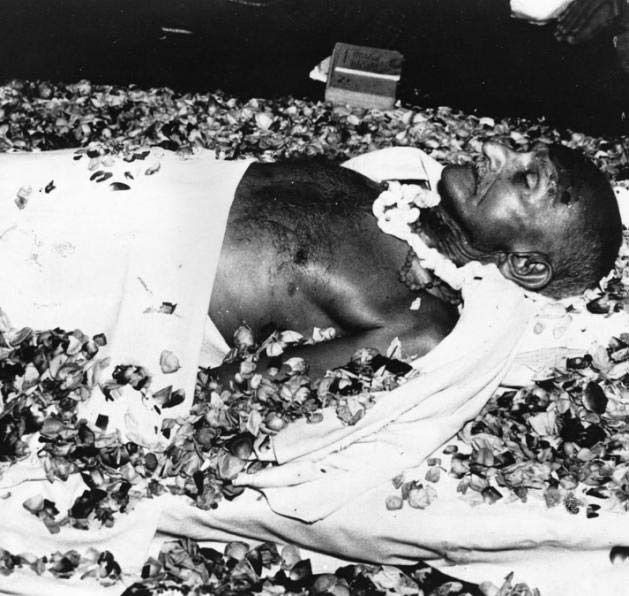
January 30, 1948, a Friday, dawned like any other day. Nobody but one man had the slightest inkling as to what was going to happen that evening. Not one person expected the day to be any different from the day before. Nobody thought of how their lives, and the destiny of a nation, were going to change very soon.
Everybody got up as usual at 3.30 in the morning. "Bapu woke Abha up before going to the toilet. He came back from the toilet and sat on the mattress for his morning prayers. We also sat before him," Kalyanam remembers.
As usual, the morning prayers commenced with recitations from the scriptures of all religions, particularly Hinduism and Islam, in order to stress the unity of all religions. While they recited, Bapu closed his eyes in meditation as was his wont.
Abha was still asleep and was not part of the morning prayers, and he noticed her absence like he noticed the absence of any of the members.
"Immediately after the prayer, Manu went to the kitchen to fetch Bapu's morning drink, a glass of hot water mixed with a tablespoonful of honey and lime. When she handed the marble tumbler to him, I heard him telling her in Gujarati, 'It appears my influence, even among my close companions, is waning. Prayer is like a broomstick meant to cleanse one's soul. Abha's failure to participate in the prayer pains me. You are aware of the importance I attach to prayers. You may, on my behalf, convey my displeasure to her. If she is not willing to participate in the prayer, she should take leave of me. This will be in our joint interest!"
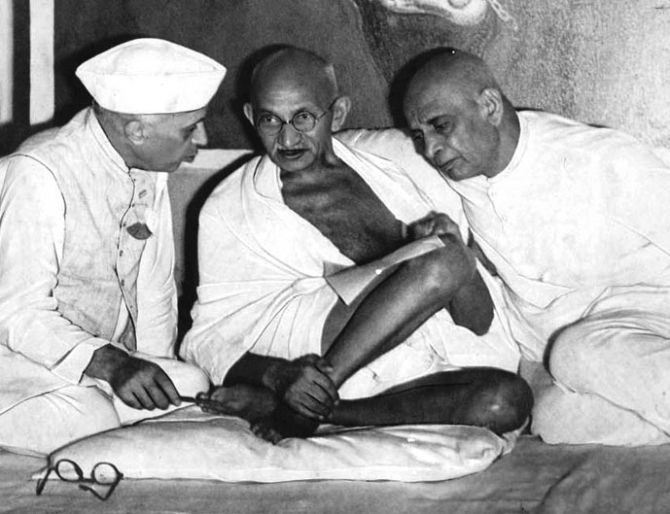
By this time, Abha woke up but Bapu did not ask her any questions. Direct confrontations were not Bapu's way of dealing with unpleasant issues. "I continued to sit by his side to receive my instructions for the day. He wanted me to make arrangements for his visit to Sevagram for 10 days on February 2. He was still thinking of going back to Sevagram."
"I then placed before him the typed draft of the new constitution for the Indian National Congress that he had dictated to me the previous day. In this, he'd suggested its disbandment and reconstitution as a new body with greater emphasis on social service and rural uplift."
"He did not want to go through it. He called Pyarelalji (his other secretary) and handed the draft to him with instructions to peruse it carefully and make any suggestions or corrections that he may consider necessary," Kalyanam remembers the day quite vividly.
At two in the afternoon, after having taking Gandhiji's permission, Abha and Manu went to visit some of their friends, promising to return in time for the prayer meeting in the evening. So the responsibility of serving Gandhiji's evening meal fell on Kalyanam.
"Although the government had been in office for only five months, the media was full of the alleged differences between Nehru and Patel. Gandhiji was distressed by these rumours and wanted to counter this. He was even thinking of asking Patel to resign so that Nehru may have a free hand to conduct the affairs of the country. He summoned Patel for a discussion at 4 pm on the subject."
"Accompanied by his daughter Maniben, Patel arrived just as Gandhiji was having his early supper, so he wasn't able to speak with Bapu until a little later."
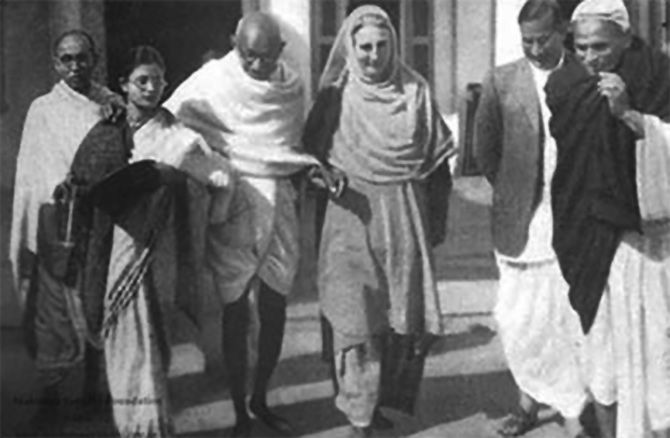
The evening prayer meeting was to start at 5 pm but the discussions between Bapu and Patel continued beyond 5 (pm). Everybody started getting worried. "We knew what they were talking about and how important and serious the matter was; naturally, none of us dared to disturb them. Manu, who'd returned a little earlier, went in when it was 5:10 and told Bapu that the time for prayer had passed."
"I heard him admonishing the girls for not telling him earlier that he was running late for the prayer meeting. He told them that they were his time-keepers. 'I am late. I do not like this at all.' When Manu replied that they did not want to interrupt because of the serious nature of their talks, Gandhiji shot back, 'It is the duty of a nurse to give medicines at the right time to the patient. If there is a delay, the patient may die.'
"He then went to the toilet and walked straight to the prayer ground, which was nearly 30-40 yards away. There were four or five steps to be climbed and then there was a big lawn. He knew he was late by 15 minutes for the prayer meeting and that showed in the way he walked. There were about 250 people anxiously awaiting his arrival. I could see from the distance that everybody there was looking at Bapu's room. As he came out, someone noticed him and shouted, 'Here comes Gandhiji.'
"Soon, every single person was looking in his direction. Bapu walked briskly as usual with his head bent and his glance glued to the ground, supporting himself on the shoulders of Manu and Abha. I followed closely to his left."
"We ascended the steps leading to the prayer platform. People stood with folded hands and Bapu reciprocated with folded hands. When people touched his feet and said 'Pranaam', he blessed them."
"Then, one person bowed down, as if he was kneeling to touch his feet. There was nothing unusual about what he did. He got up, and shot Bapu. I missed the bullet by a few inches."
"What happened after that was hazy. He fell down, bleeding profusely. In the melee, his spectacles and slippers fell away. I was too shocked and dumb-founded to react. People around me were shouting and crying loudly."
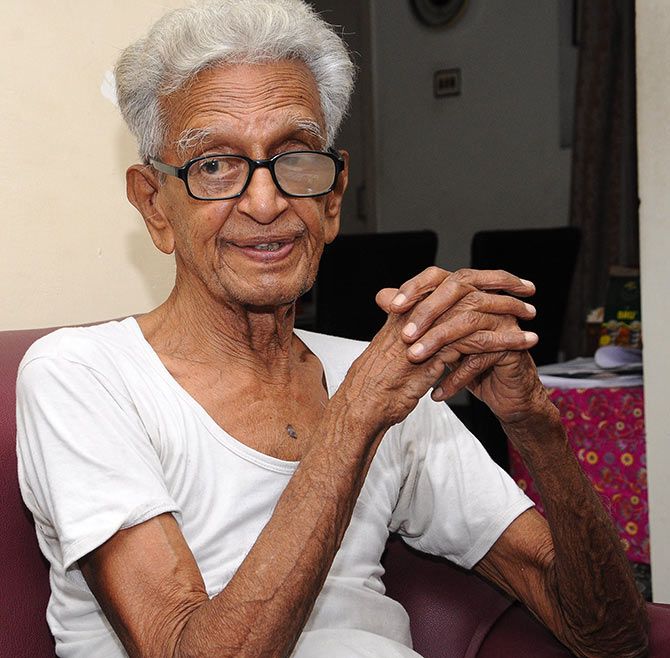
The news spread fast. Within minutes, there was a huge crowd outside Birla House and they had to close the gate to prevent people entering the premises. Soon, somebody carried Bapu's body to his room but the wailing crowd also scrambled to collect something belonging to him as a souvenir.
"They even scooped a handful of earth from the place where Bapu fell to the assassin's bullet, leaving a big pit there within hours. We cordoned off the area and posted a guard outside the gate."
Kalyanam rushed to his room and called Nehru's office and told them the news. "After having informed the prime minister's office, I pushed my way through the crowd, got into a car and rushed to (Sardar Vallabhai) Patel's house to inform him of the calamity. He'd left Birla House just before the prayer meeting started. It was to him that Bapu spoke last."
Sardar Patel was too shocked to react when Kalyanam broke the news to him. After all, he spoke to him just a few minutes ago.
Later Patel said, 'I had personally pleaded with Bapu to permit the police to do their duty in regard to his protection but without success. To my profound regret and utter sorrow and to the irreparable loss of all of us, the nation and the world, the weak spot both I and the police had spotted was deceitfully and successfully exploited by the assassin, and Gandhiji's prophetic words have come true; that, if he had to die, nobody could save him.'
After informing all the important people in the government, Kalyanam was back at Birla House to sit near Bapu's body. "There he lay on the mat with people around him. He looked as if he was asleep. I touched him and found that his body was still warm."
"Nobody could forget that night. It was a terrible day for not just us but for the millions of people all over the world for whom he lived and died. It was only later, as I sat alone, that tears came to my eyes. Till then, I was in such a state of shock that not a single tear came out of my eyes."
"The gravity of the situation, the bitter truth... all dawned on me as I sat next to him. I thought, a great man had been killed: a man who believed in non-violence, a man who wouldn't harm a living thing. It was such a man that had been put to death by a violent man. He didn't deserve such a death..."
That was the end of Kalayanam's very close association of four years with the Mahatma. "I consider him a unique personality. He believed in non-violence, and never harmed anybody with his words or deeds. He never spoke ill of anybody. He always spoke the truth and always wanted to do the right thing."
"He wanted people to live in peace and disliked war. He led a very simple life. It may take another 2,000 years for the world to see another person like Bapu. He lived his entire life for the country but died a disillusioned, disheartened, disenchanted and disappointed man."
Excerpted from His Days With Bapu: Mahatma Gandhi's Personal Secretary Recalls by Shobha Warrier, Vitasta Publishing, with the author's permission.
You can buy a copy of the book here.

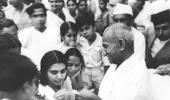









 © 2025
© 2025